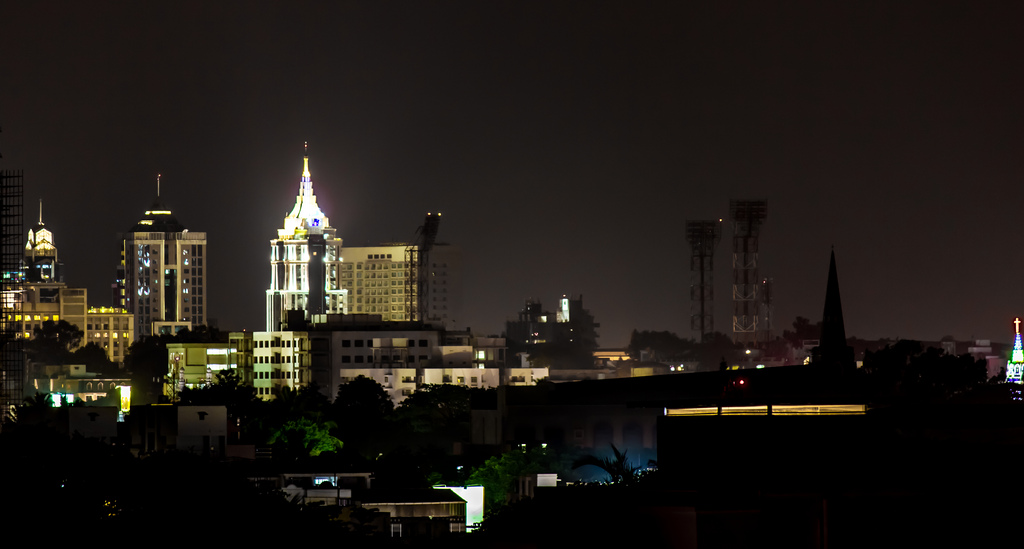He tells about Koramangala, near the south-east of the city:
- Here is a lot start-ups, venture capital money, everything is spinning at full speed. Entrepreneurs are young, very ambitious. I live in the midst of all this and get a lot of fun.
Koramangala is not only technological cluster. There is also Whitefield, and a bunch of business parks in the Outer Ring Road.
- We have literally got the second coming here, - says the founder of InMobi startup, which is estimated at more than $ 1 billion and competes with Google and Facebook, Naveen Tewari. The term "disruptive innovation" is mentioned in almost every conversation with Bangalore startups. This cliché, came from Silicon Valley, means changes, giving an advantage to new players and undermine the business of old.
Koramangala’s corners have sheltered many technological talents, starting with one of the largest Indian online store Flipkart. Founded in 2007, the startup is now struggling with Amazon for market dominance. There is also the headquarters of the online service by Taxi Ola.
Dozens of young men are leaning in close quarters over the tiny tables, hammering on the laptop keyboard, ignore bean bags and table football on the fourth floor of the office building. Ola invests in Japanese SoftBank, valuation of the company - $ 2 billion. In India, the service was able to leave Uber behind them.
Venture investors are presented widely too, starting from local Helion Venture Partners to the western US players like Accel Partners.
- Companies like Ola in Bangalore enjoy the attention of Silicon Valley, - says the former CEO of Vodafone Arun Sarin, who recently became a member of the Ola directors’ board.
The second Bangalore’s birth is obliged to three factors. The first - the growth of the Internet audience, especially the owners of smartphones - there is about 150 million of them in India. And by 2020, the number can jump up to 750 million, making the country the second largest online customer after China.
Money is the second factor. Not long ago, a number of prominent venture capitalists from the United States have closed their offices in India, complaining of over-regulation and poor infrastructure. However, there appeared new investors, from Asian giants like SoftBank and Alibaba to New York’s Tiger Global. Many of them invest the money earned in the Chinese Internet boom.
Outdoor advertising is captured by startups.
- The arrival of big money means that we can compete on wages with Google, - says Anshul Rai, co-founder of Happay online payment system. - When you drink coffee at Starbucks, half of the people nearby are talking about startupa. And the other half - about looking for employees.
People, having these conversations, are the third factor in the development of Bangalore. The city has one of the best in the world community of talented programmers, that barely concedes to Silicon Valley, boasts Vivek Prakash, the co-founder of the local developer HackerEarth.
Many startups’ founders began their career as a full-time staff or large Indian companies or the local offices of international giants like IBM or Google. One of Bangalore’s greatest ambitions - the development of its own products instead of the usual for India's software development outsourcing. Sharad Sharma, co-founder of iSpirt company, says: “Serving as the back office of the world was an accomplishment for the older generation’s companies. The young believes that India needs to be more ambitious. We are going to conquer the world.”
source: ft.com
- Here is a lot start-ups, venture capital money, everything is spinning at full speed. Entrepreneurs are young, very ambitious. I live in the midst of all this and get a lot of fun.
Koramangala is not only technological cluster. There is also Whitefield, and a bunch of business parks in the Outer Ring Road.
- We have literally got the second coming here, - says the founder of InMobi startup, which is estimated at more than $ 1 billion and competes with Google and Facebook, Naveen Tewari. The term "disruptive innovation" is mentioned in almost every conversation with Bangalore startups. This cliché, came from Silicon Valley, means changes, giving an advantage to new players and undermine the business of old.
Koramangala’s corners have sheltered many technological talents, starting with one of the largest Indian online store Flipkart. Founded in 2007, the startup is now struggling with Amazon for market dominance. There is also the headquarters of the online service by Taxi Ola.
Dozens of young men are leaning in close quarters over the tiny tables, hammering on the laptop keyboard, ignore bean bags and table football on the fourth floor of the office building. Ola invests in Japanese SoftBank, valuation of the company - $ 2 billion. In India, the service was able to leave Uber behind them.
Venture investors are presented widely too, starting from local Helion Venture Partners to the western US players like Accel Partners.
- Companies like Ola in Bangalore enjoy the attention of Silicon Valley, - says the former CEO of Vodafone Arun Sarin, who recently became a member of the Ola directors’ board.
The second Bangalore’s birth is obliged to three factors. The first - the growth of the Internet audience, especially the owners of smartphones - there is about 150 million of them in India. And by 2020, the number can jump up to 750 million, making the country the second largest online customer after China.
Money is the second factor. Not long ago, a number of prominent venture capitalists from the United States have closed their offices in India, complaining of over-regulation and poor infrastructure. However, there appeared new investors, from Asian giants like SoftBank and Alibaba to New York’s Tiger Global. Many of them invest the money earned in the Chinese Internet boom.
Outdoor advertising is captured by startups.
- The arrival of big money means that we can compete on wages with Google, - says Anshul Rai, co-founder of Happay online payment system. - When you drink coffee at Starbucks, half of the people nearby are talking about startupa. And the other half - about looking for employees.
People, having these conversations, are the third factor in the development of Bangalore. The city has one of the best in the world community of talented programmers, that barely concedes to Silicon Valley, boasts Vivek Prakash, the co-founder of the local developer HackerEarth.
Many startups’ founders began their career as a full-time staff or large Indian companies or the local offices of international giants like IBM or Google. One of Bangalore’s greatest ambitions - the development of its own products instead of the usual for India's software development outsourcing. Sharad Sharma, co-founder of iSpirt company, says: “Serving as the back office of the world was an accomplishment for the older generation’s companies. The young believes that India needs to be more ambitious. We are going to conquer the world.”
source: ft.com



















